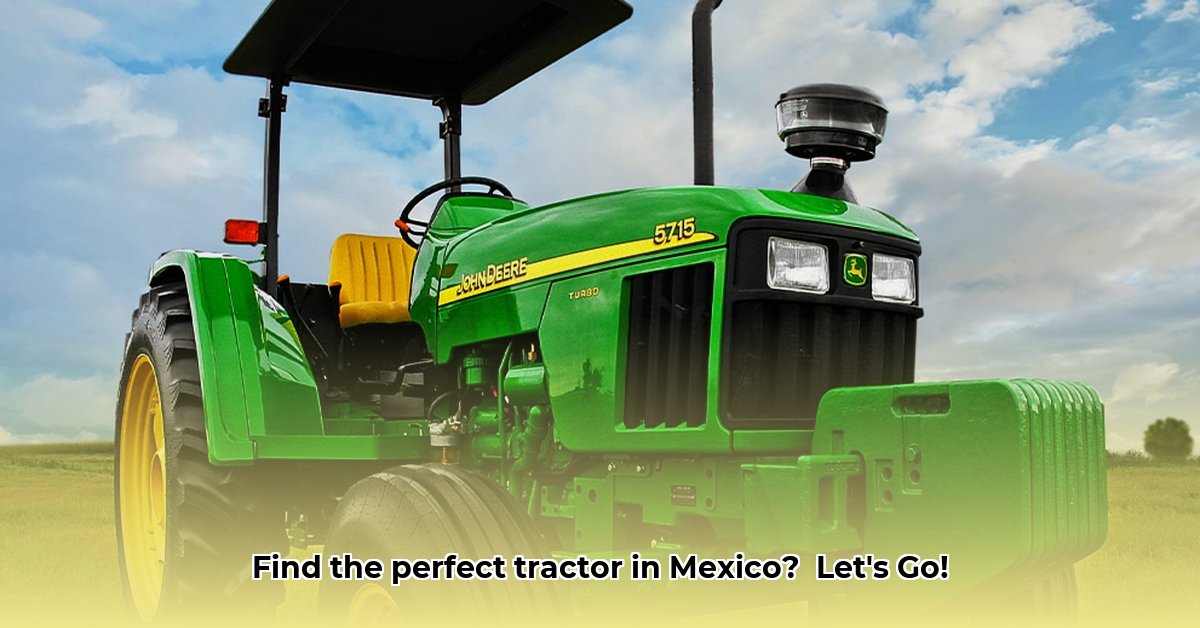
Choosing the Right Tractor: Size, Sustainability, and Budget
Buying a tractor in Mexico is a significant investment, especially for sustainable farming. The right tractor can dramatically improve efficiency and minimize environmental impact. But with varying sizes and prices, understanding your needs is crucial. This guide helps you navigate the "tractor en Mexico precio" landscape and choose wisely. For additional financing options, check out our tractor loan guide.
Do you prioritize fuel efficiency and reduced soil compaction? Or is raw power and speed your primary concern? The answer dictates the type of tractor best suited for your operation.
Small, compact tractors are perfect for smaller farms or those focused on diverse crops. Their fuel efficiency and reduced soil compaction align perfectly with sustainable practices. However, they may lack power for heavy tasks. Larger tractors, while powerful, consume more fuel and can significantly compact soil, impacting long-term soil health. Finding the balance between capability and sustainability is key.
Types of Tractors and Their Suitability in Mexico
The Mexican market offers a variety of tractors, each impacting sustainability differently:
Compact Tractors: Ideal for smaller farms, minimizing soil compaction and fuel use. They excel in precision agriculture, enabling targeted treatments and reducing resource waste.
- Pros: Lower initial cost, fuel efficiency, maneuverability, reduced soil compaction.
- Cons: Limited power for intensive tasks.
Larger Tractors: Suit larger operations but demand more fuel and can compact soil, potentially harming long-term soil health.
- Pros: High power output, ideal for extensive land.
- Cons: Higher purchase price, increased fuel consumption, potential for excessive soil compaction.
Electric/Alternative Fuel Tractors: Offer zero or significantly reduced emissions. However, high initial cost and limited availability in Mexico currently present challenges.
- Pros: Zero or reduced emissions.
- Cons: High initial cost, limited availability, potential range limitations.
Decoding Tractor en Mexico Precio: Factors Influencing Cost
Prices for tractors in Mexico vary widely depending on several factors:
Brand Reputation: Established brands often command higher prices due to perceived quality and technological advancements.
Features: Advanced features like GPS guidance, automatic transmissions, and specialized implements significantly increase costs. Prioritize features essential to your operation.
Engine Type and Horsepower: Powerful engines translate to higher costs. Assess your power requirements carefully to avoid unnecessary expense.
Condition: New tractors are pricier but used tractors, inspected thoroughly, offer cost savings. Carefully evaluate the condition and potential maintenance needs.
Dealer Markups: Dealers vary in pricing. Shop around to compare offers and find the best deals.
A recent survey indicated that compact tractors range from 200,000 to 800,000 MXN, medium-sized tractors from 800,000 to 2,000,000 MXN, and larger tractors exceeding 2,000,000 MXN. However, actual prices vary significantly.
Financing Your Tractor: Securing Affordable Options
The high cost of tractors necessitates exploring financing options:
Government Subsidies: Investigate government programs providing subsidies or incentives for sustainable agricultural equipment purchases.
Bank Loans: Explore agricultural loans from various banks. Compare interest rates and repayment terms carefully.
Leasing: Consider leasing as an alternative to outright purchase, particularly for short-term needs or when budget is tight.
Tractor Maintenance and Sustainable Operation
Proper maintenance is essential to prolong your tractor’s lifespan and minimize environmental impact.
Manufacturer's Recommendations: Adhere strictly to the manufacturer’s maintenance schedule.
Regular Fluid Checks: Regularly check and maintain oil, coolant, and other fluid levels to prevent engine damage.
Wear and Tear Inspection: Regularly inspect belts, hoses, and other components for wear and tear to address issues early.
Professional Servicing: Schedule annual professional servicing to ensure peak performance and prevent unexpected breakdowns.
Finding Your Tractor: Resources and Recommendations
Dealers: Consult local agricultural equipment dealers for new and used tractors, expert advice, and financing options.
Online Marketplaces: Explore online platforms like MercadoLibre for a wide selection and price comparison. Thoroughly inspect used tractors before buying.
By carefully considering these factors and engaging in thorough research, you can find the perfect tractor tailored to your farming needs while prioritizing sustainability and cost-effectiveness. Remember, sustainable agriculture is a continuous journey of adaptation and improvement.